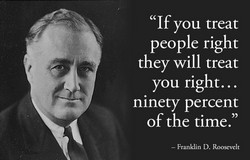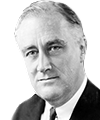Franklin Delano Roosevelt Quotes
|
| updated |
Copy Link Code
|
 President Franklin Delano Roosevelt's quotes are some of the most used of all time. His presidency marked a time of economic and social challenges during the Great Depression and World War II; Americans needed a president who talked to them, not at them. FDR had this gift. With a calm, easy manner of speaking, he brought the world into their living rooms, sharing with the people his plan and why it was right for America. The following quotes by Franklin Roosevelt are indicative of his vision, his perception of what America was and his relentless pursuit of freedom, peace and human rights for the world.
President Franklin Delano Roosevelt's quotes are some of the most used of all time. His presidency marked a time of economic and social challenges during the Great Depression and World War II; Americans needed a president who talked to them, not at them. FDR had this gift. With a calm, easy manner of speaking, he brought the world into their living rooms, sharing with the people his plan and why it was right for America. The following quotes by Franklin Roosevelt are indicative of his vision, his perception of what America was and his relentless pursuit of freedom, peace and human rights for the world.
- So, first of all, let me assert my firm belief that the only thing we have to fear is fear itself - nameless, unreasoning, unjustified terror which paralyzes needed efforts to convert retreat into advance.( First Inaugural Address, March 4, 1933)
- It is common sense to take a method and try it; if it fails, admit it frankly and try another. But above all, try something. (Address at Oglethorpe University, May 22, 1932)
- Men are not prisoners of fate, but only prisoners of their own minds. (Pan American Day Address, April 15, 1939)
- The only limit to our realization of tomorrow will be our doubts of today. Let us move forward with strong and active faith. (From the undelivered Thomas Jefferson Day Speech to be delivered on April 14, 1945. FDR died on April 12, 1945)
- Happiness is not in the mere possession of money; it lies in the joy of achievement, in the thrill of creative effort. (First Inaugural Address, March 4, 1933)
- There is a mysterious cycle in human events. To some generations much is given. Of other generations much is expected. This generation of Americans has a rendezvous with destiny. (Speech to the Democratic National Convention, June 27, 1936)
- There are many ways of going forward, but only one way of standing still. (Date unknown)
- To reach a port we must set sail - Sail, not tie at anchor. Sail, not drift. (Fireside chat, April 14, 1938)
- True individual freedom cannot exist without economic security and independence. (State of the Union Speech, January 11, 1944)
- In the truest sense, freedom cannot be bestowed; it must be achieved. (Speech location unknown, September 22, 1936)
- Freedom means the supremacy of human rights everywhere. Our support goes to those who struggle to gain those rights and keep them. Our strength is our unity of purpose. To that high concept there can be no end save victory. (Address to Congress, January 6, 1941)
- The only sure bulwark of continuing liberty is a government strong enough to protect the interests of the people, and a people strong enough and well enough informed to maintain its sovereign control over the government. (Fireside chat, April 14, 1938)
- Freedom to learn is the first necessity of guaranteeing that man himself shall be self-reliant enough to be free. (Address to the National Education Association, June 30, 1938)
- Democracy cannot succeed unless those who express their choice are prepared to choose wisely. The real safeguard of democracy, therefore, is education. (Message for American Education Week, September 27, 1938)
- We cannot always build the future for our youth, but we can build our youth for the future. (Address at the University of Pennsylvania, September 20, 1940)
- I think we consider too much the good luck of the early bird and not enough the bad luck of the early worm. (To Henry Heymann, December 2, 1919)
- The school is the last expenditure upon which American should not be willing to compromise. (Campaign Address in Kansas City, Mo., October 13, 1936)
- Today we are faced with the pre-eminent fact that if civilization is to survive, we must cultivate the science of human relationships, the ability of all peoples of all kinds to live together and to work together in the same world at peace. (Undelivered Address for Jefferson Day, April 14, 1945)
- We can gain no lasting peace if we approach it with suspicion and mistrust or with fear. We can gain it only if we proceed with the understanding, the confidence, and the courage which flow from conviction. (Fourth Inaugural Address, January 20, 1945)
- As long as it remains within my power to prevent it, there will be no blackout of peace in the United States. (Fireside Chat, September 3, 1939)
- Among American citizens, there should be no forgotten men, and no forgotten races. (Location unknown, October 26, 1936)
- I see one-third of a nation ill-housed, ill-clad, ill-nourished. The test of our progress is not whether we add more to the abundance of those who have much; it is whether we provide enough for those who have too little. (Second Inaugural Address, January 20, 1937)
- No country, however rich, can afford the waste of its human resources. Demoralization caused by vast unemployment is our greatest extravagance. Morally, it is the greatest menace to our social order. (Fireside Chat, September 30, 1934)
- In these days of difficulty, we Americans everywhere must and shall choose a path of social justice...The path of faith, the path of hope, and the path of love toward our fellow man. (Campaign Address at Detroit, October 2, 1932)
- The structure of world peace cannot be the work of one man, or one party, or one nation...it must be a peace which rests on the cooperative effort of the whole world. (Message to Congress following the Yalta Conference, March 1, 1945)
- Human kindness has never weakened the stamina or softened the fiber of a free people. A nation does not have to be cruel to be tough. (Address at Madison Square Garden, New York City, October 31, 1936)
